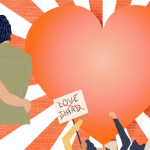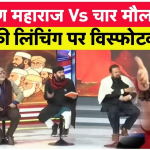
LGBTQIA+: Madras HC guidelines for sensitisation of stakeholders Detailed directions to police, judiciary, legal aid services and central ministries
09, Jun 2021 | CJP Team
The Madras High Court on June 7 established a landmark approach towards addressing the social issue of acceptance of the LGBTQIA+ community. The 104-page judgement delivered by Justice Venkatesh is a pioneering judgement in the way it has dealt with clearing out the court’s prejudices and has made an attempt towards transformative jurisprudence. The judgement describes in detail the transformative process undergone by the judge as well as the parents of the petitioners who are in a same sex relationship.
While addressing social prejudices, the court, in conclusion, has also laid out some guidelines that could help shape the attitude of government authorities / public servants when dealing with the members of the LGBTQIA+ community. The court gave some directions expecting the authorities to implement the guidelines in letter and spirit, not for the sake of complying with a judicial fiat, but to ensure that this society evolves, and the LGBTQIA+ community is not pushed out of the mainstream of the society.
For the police
- The police, on receipt of any complaint regarding girl/woman/man missing cases which upon enquiry/investigation is found to involve consenting adults belonging to the LGBTQIA+ community, shall upon receipt of their statements, close the complaint without subjecting them to any harassment.
Government
- The Ministry of Social Justice & Empowerment (MSJE), has to enlist Non-Governmental Organizations (NGOs) including community-based groups which have sufficient expertise in handling the issues faced by the LGBTQIA+ community.
- The list of such NGOs along with the address, contact details, and services provided shall be published and revised periodically on the official website, within 8 weeks
- Any person who faces an issue for the reason of their belongingness to the LGBTQIA+ community may approach any of the enlisted NGOs for safeguarding and protecting their rights.
- The concerned NGO in consultation with the MSJE, shall maintain confidential records of such persons who approach the enlisted NGOs and the aggregate data shall be provided to the concerned Ministry bi-annually.
- The problems shall be addressed with the best-suited method depending on the facts and circumstances of each case be it counselling, monetary support, legal assistance with the support of District Legal Services Authority, or to co-ordinate with law enforcement agencies about offenses committed against any persons belonging to the LGBTQIA+ community.
- MSJE shall make adequate infrastructural arrangements within 12 weeks so that member of the LGBTQIA+ community, who require shelters and/or homes can seek shelter in short stay homes, Anganwadi shelters, and “garima greh” (a shelter home for transgender persons
- The Union and State Governments respectively, in consultation with such other Ministries and/or Departments shall endeavour to device such other measures that are needed for eliminating prejudices against the LGBTQIA+ community
Sensitisation programmes
Police and Prison Authorities
- Programs at regular intervals on steps to be taken for protection from and prevention of offences against the LGBTQIA+ community
- Conduct sensitization about legal rights of LGBTQIA+ community at regular intervals.
- Programmes creating awareness among police personnel about the Offences and Penalties as stipulated under Chapter VIII of The Transgender Persons (Protection of Rights) Act, 2019 and compliance of Rule 11 of the Transgender Persons (Protection of Rights) Rules, 2020.
- Outreach programs to be conducted by the NGOs with community support to put forth first-hand problems faced in the hands of law enforcement agencies, and to train them in providing effective assistance.
- Ensure that transgender and gender-nonconforming prisoners are housed separately from cis-men prisoners to eliminate chances of sexual assault by the latter on the former.
District and State Legal Service Authorities
- Awareness programs in relation to the rights of transgender persons and prohibition of discrimination against them under The Transgender Persons (Protection of Rights) Act, 2019 periodically to be conducted in association with NGOs and community support, to understand and provide effective legal services to them.
- The benefit of free legal aid to be extended for the members of the LGBTQIA+ community.
- Inclusion of issues faced by the LGBTQIA+ community in Lok Adalat.
Judiciary
- Conduct awareness programmes for Judicial Officers at all levels in coordination with the enlisted NGOs and community support and to provide suggestions/ recommendations to ensure non-discrimination of persons belonging to the LGBTQIA+ community.
Physical and Mental Health Professionals
- Assistance to LGBTQIA+ community and their environment, by affording Physical and Mental health support who are facing stigma and discrimination from society.
- Mental health camps and awareness programs to understand gender, sexuality, sexual orientation and promote acceptance of diversity.
- Prohibit any attempts to medically “cure” or change the sexual orientation of LGBTIQA+ people to heterosexual or the gender identity of transgender people to cisgender.
- To take action against the concerned professional involving themselves in any form or method of conversion “therapy”, including withdrawal of license to practice.
- Sensitization programs as provided by Rule 10(7)(b) of Transgender Persons (Protection of Rights) Rules, 2020
Union Ministry of Education & Education Dept Tamil Nadu & ors
- Effective change in curricula of Schools and Universities to educate students on understanding the LGBTQIA + Community.
- Outreach programs to be conducted in association with NGOs and members of the LGBTQIA+ Community.
- Through Parents-Teacher Association (PTA) meetings, sensitize parents on issues of LGBTQIA+ community and gender nonconforming students, to ensure supportive families.
- Amendment of necessary policies and resources to include students belonging to LGBTQIA+ community in all spheres such as: 1. availability of gender-neutral restrooms for the gender-nonconforming student; 2. Change of name and gender on academic records for transgender persons 3. Inclusion of ‘transgender’ columns in application forms for admission, competitive entrance exams, etc.
- Appointment of counsellors who are LGBTQIA+ inclusive, for the staffs and students to address grievances, if any, and to provide effective solutions for the same
- take effective steps to implement measures in relation to transgender persons as stipulated by Chapter VI of The Transgender Persons (Protection of Rights) Act, 2019 and Rule 10 of the Transgender Persons (Protection of Rights) Rules, 2020.
Ministry of Women and Child Development
- Non-pathologizing of gender diverse children, intersex children, and LGBTQIA+ youth.
- Sensitization and orientation of Anganwadi Workers and similar personnel on transgender issues, and involve themselves in assisting the parents of LGBTQIA+ youth.
Union and central govt
- Awareness programs and workshops, with the help of LGBTQIA+ members/workers, for inclusion of LGBTQIA+ community, amongst the employees
- Sensitization on prohibition of discrimination as provided in The Transgender Persons (Protection of Rights) Act, 2019 and relevant rules
- Suitable changes in hiring policies for inclusivity and Setting up and enforcement of Human Resource policies to make them LGBTQIA+ community-friendly.
- Support members of the LGBTQIA+ community in case of any grievance and extension of benefits like insurance
- adopt suitable policies that address non-discrimination on grounds of sexual orientation, including sexual harassment of persons belonging to the LGBTQIA+ community, in workplace.
Ministry of Social Justice & Empowerment
- Understanding and accepting children of diverse gender expressions, sexual orientation, gender identities and gender presentation.
- Provide peer support for parents of members belonging to the LGBTQIA+ community through support groups.
The court understood that implementing these directions would take time and monitoring the same is important and hence, instead of disposing the petition, has kept it pending to issue continuing mandamus.
The court has posted the matter for August 31 for passing further orders and asked concerned departments, police, counsels representing the State and the Centre to ensure that compliance reports with regards to these directions are filed before the next date.
The complete judgement may be read here:
Related:
When a judge allows himself to be counselled, justice can mean a transformation
Allahabad HC reinstates LGBTQIA member as Home Guard, deems cancellation order ‘vindictive’
Enable Transgender Community to apply for Constable Post: Patna High Court









